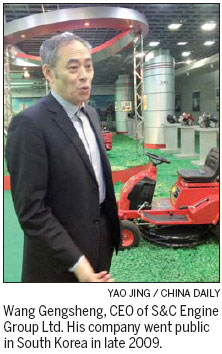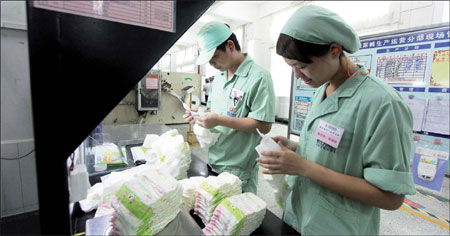Not so fast
Updated: 2013-01-18 09:07
By Yao Jing, Cecily Liu and Hu Meidong (China Daily)
|
|||||||||||
|
Employees of Hengan International Group check the products at the company's workshop in Jinjiang. The company went public in Hong Kong in 1998. Provided to China Daily |

Companies must think twice before planning IPOs / floats in overseas bourses, experts warn
The numbers are staggering for any Chinese CEO hoping to take his company public: More than 800 companies are on waitlists to secure initial public offerings in the nation's stock markets. Last year, there was a 43.5 percent decline (from the previous year) in the number of Chinese companies that went public and a 57.2 percent drop in the amount of funds raised. Those are not very promising prospects. That is, unless you're a CEO looking abroad.
As of Jan 1, the China Securities Regulatory Commission enacted new guidelines to lower the barrier on companies interested in an overseas listing. In effect, it stripped away the regulations that required Chinese companies applying for an overseas IPO must have at least 400 million yuan ($64 million; 48 million euros) in net assets and that they must raise $50 million (37 million euros) or more as well as generate a minimum of 60 million yuan in annual profits.
Zhang Qi, a financial analyst at Zero2IPO Research Center, says that "the new rules will help ease the pressure on China's A-share markets and (Chinese companies interested in going public) can raise funds from overseas markets to develop their businesses".
The timing of the lowered threshold couldn't be more right for China. The mainland's stock markets are heading into a third year of decline and smaller companies are in dire need of financing. The new guidelines should allow easier overseas listings for the nation's small, private businesses, who now only have to meet the standards of the market in which they want to sell shares.
But before the guidelines were passed, several small and medium-sized companies from China had already found a way to go public on overseas stock markets through the so-called red chip structure. The process is simple: Companies first establish an offshore holding company, which then acquires control over the operating company in China; when the holding company secures its IPO, it no longer needs CSRC's approval.
With the regulation change, Chinese SMEs can still go public overseas through the red-chip structure. This has led many industry insiders to believe the new regulation will have little impact on Chinese IPOs in overseas markets, though they point out that the new rules reflect a new CSRC attitude, akin to an encouraging message for Chinese SMEs listing overseas.
"The new regulation reflects a more open minded attitude of the CSRC. It allows Chinese companies more opportunities to choose a suitable overseas market for IPO rather than being prevented from getting to that point by domestic rules," says Amanda Yao, a senior associate at international law firm Pinsent Masons LLP.
But Yao clarifies that "the new regulation applies directly to a listed company incorporated in China, which is traditionally more popular for State-owned companies' listings in Hong Kong.
"But most individually owned SMEs may still prefer to list overseas through the red chip structure," she says. "This is because overseas investors may feel more comfortable investing in a listed company set up in a jurisdiction they are more familiar with."
Matt Butlin, head of equities at Allenby Capital, is a bit cautious about Chinese companies looking overseas. Butlin is an adviser and broker on the Alternative Investment Market, the London Stock Exchange's market for small cap companies that was launched in 1995.
About 40 Chinese companies are currently listed on AIM, which has no profit or market cap requirements for IPO candidates.
He says London advisers know there is a limited investor appetite for small Chinese companies.
Thus far, 50 Chinese companies have been delisted from United States stock markets for various accounting irregularities, according to the Financial Times.
"Currently the market is wary of Chinese companies. To attract fund managers, Chinese companies have to have a relatively big market capitalization and profit levels. So the new rules probably wouldn't make a substantial impact on Chinese companies coming to London for listing," he says.
Recent Chinese IPOs on AIM include the logistics company China Chaintek United Co Ltd based in Fujian province, which raised 7.52 million pounds ($12 million; 9 million euros) last August and the IT components supplier Kada Technology Holdings Ltd based in Shenzhen, Guangdong province, which raised 1.33 million pounds in July.
But in 2012, the most popular destinations for Chinese companies were the Hong Kong, Nasdaq, New York and Frankfurt stock exchanges.
Hong Kong accounted for 97.1 percent of the total amount of funds raised by Chinese companies in overseas markets. Only two companies secured listings in the United States, according to Zero2IPO Research Center, while six Chinese companies went for IPOs in Frankfurt, raising $105 million. Adding to the aforementioned gloom, the funds raised in 2012 in Frankfurt amounted to only half of what was raised in 2011.
But two of the Chinese companies which secured an IPO in Frankfurt are from Jinjiang, Fujian province, a city with about 40 listed enterprises.
Goldrooster, a sportswear producer based in Jinjiang, went public on the Frankfurt bourse last May and sold 720,000 shares at 4.10 euros ($5.45) each, raising about 1.88 million euros.
Kuaijiezou Sport Apparel Co, also based in Jinjiang, went public last July under the name of Fast Casualwear AG Co at 5 euros per share, raising 5.3 million euros. The shares a month later, however, declined more than 50 percent.
"(The Frankfurt stock exchange) has lower standards and it is more suitable for small businesses as the amount of financing is always less," Zhang says.
Alexander von Preysing, head of issuer services at Deutsche Boerse AG, says that Chinese companies have many different motivations for a Frankfurt listing.
"Because Deutsche Boerse has strict transparency and corporate governance rules, some Chinese companies get listed on the exchange to demonstrate that they have good corporate governance, because they can fulfill these rules," he says. "Other Chinese companies list here to be among their peer group companies since Deutsche Boerse has a high concentration of companies in certain industries."
Ni Zhongsen, chairman of Quanzhou-based Hengrun Capital, which has helped Jinjiang firms go public, says that the new CSRC guidelines will lead Jinjiang companies to overseas markets.
"Some of the local companies are rushing into going public just because they have arrived at the point of entering into the capital market," Ni says. "Some are just following others."
Ni warns that if a company is not planning to explore the European or US markets, it should think again.
Since Hengan International Group Co, China's largest producer of tissues and sanitary napkins, went public in Hong Kong in 1998, 38 other Jinjiang companies have successfully gone public. Thirty-four of them are listed in overseas markets, according to the city government.
"Most of the businesses in Jin-jiang are family-owned, and they cannot compete with big state-owned companies in terms of financial and management powers in the domestic A-share market," says Liu Xiangyang, director of the Jinjiang financial services office.
Liu says although the funds raised in overseas markets are less compared with what can be raised in China's A-share market, it is more cost-effective because of the lower risks and the previously high threshold.
"Apart from raising funds to upgrade industries, companies can further expand into the international market. And since many enterprises in the same industry in Jinjiang are going after IPOs, overseas markets have become a different path for them," he says.
The disadvantage of being a family business, however, has been the lack of innovative measures. Many Jinjiang-based companies that China Daily spoke to are still probing for a way to take advantage of a listing.
S&C Engine Group Ltd, a manufacturer of motorcycles, lawn mowers and parts, went public in South Korea in late 2009. Its lawn mowers are mainly supplied to middle-class families in Australia and Europe.
Although the company routinely sells 150,000 mowers in Europe each year, and while 20 percent of its revenue comes from markets in Europe and Australia, it chose South Korea, where the company has no market traction.
"We were considering the most convenient way to go public. If we go to Europe, the maintenance fees after the IPO would be more than 3 million euros every year. But we are spending 3 million yuan in financial auditing, information disclosure and transporting in general each year," says Wang Gengsheng, CEO of S&C Engine Group Ltd.
Revenue has since increased 45 percent to 1.1 billion yuan since its South Korean listing, which helped the company raise about 70 billion Korean won ($66 million; 50 million euros).
Wang says the main focus of raising funds was to acquire companies. However, most of the funds were used for research and development to improve its lawn mowers.
"Investors are not very satisfied with us because they have not earned much money. We are persuading them to give us a longer time as the traditional manufacturing industry always acts slower compared with other industries such as IT and real estate," the 62-year-old says.
Wang points out that financial transparency is the most important factor in communicating with investors and he has persuaded investors to give him enough time to develop his business.
Sansd (Fujian) Plastic Co Ltd, a rubber and foam producer, went public in Taiwan in 2011, raising NT$ 1.3 billion ($44 million; 34 million euros).
"The money was mainly used for building the new factory that is 91, 333 square meters. Our productivity has doubled, and we are looking at ways to lower the cost, improve the management and the industrial chain," says Ding Zhiwei, vice-president of Sansd.
Turnover has increased about 20 percent from 1 billion yuan in the year it was listed. Ding says an IPO is not only a financing platform, it can help a family-run business like Sansd take the next step.
"Our auditing company from Taiwan always randomly checks the financial status of the company and tells us how to regulate each chain of production and management," Ding says.
Still, Jinjiang is known as a city of sportswear makers and China's sportswear industry is now facing overcapacity, with market leaders including Anta Co and Peak Product Co, which went public in Hong Kong in 2007 and 2009, closing stores on the mainland. Experts say companies that want to go public should carefully consider their motivations and how they will maintain their shares after an IPO.
Nicholas Emmerson, a partner at international law firm Eversheds LLP, warns that Chinese companies should not rush into an overseas listing because they may find it difficult to raise capital abroad if they are too small or do not have sound expansion plans.
"For example, it doesn't make sense for a small family business with family ambitions to list overseas just because the new regulation allows it to," he says. "Chinese companies on overseas stock exchanges would receive better valuations overall if the new regulation brings more good quality Chinese companies overseas."
Contact the writers at yaojing@chinadaily.com.cn, cecily.liu@chinadaily.com.cn, and humeidong@chinadaily.com.cn
(China Daily 01/18/2013 page12)
Today's Top News
Police continue manhunt for 2nd bombing suspect
H7N9 flu transmission studied
8% growth predicted for Q2
Nuke reactor gets foreign contract
First couple on Time's list of most influential
'Green' awareness levels drop in Beijing
Palace Museum spruces up
Trading channels 'need to broaden'
Hot Topics
Lunar probe , China growth forecasts, Emission rules get tougher, China seen through 'colored lens', International board,
Editor's Picks

|

|

|

|

|

|






